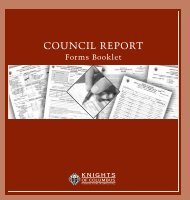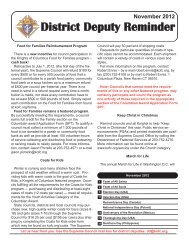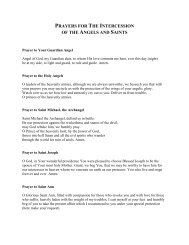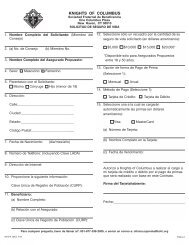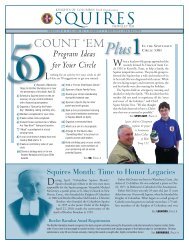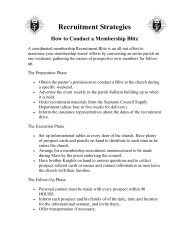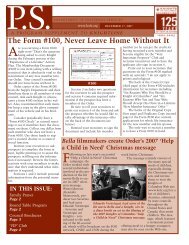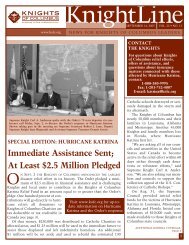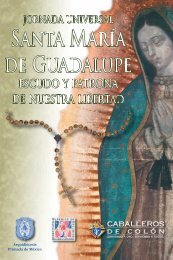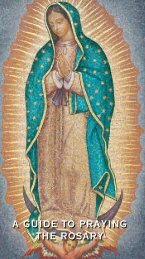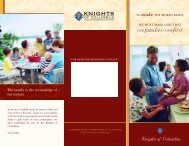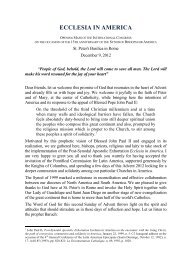Financial Secretary Handbook - Knights of Columbus, Supreme ...
Financial Secretary Handbook - Knights of Columbus, Supreme ...
Financial Secretary Handbook - Knights of Columbus, Supreme ...
You also want an ePaper? Increase the reach of your titles
YUMPU automatically turns print PDFs into web optimized ePapers that Google loves.
Are <strong>Knights</strong> <strong>of</strong> <strong>Columbus</strong> councils and assemblies<br />
exempt from state sales tax?<br />
Generally, state legislatures grant state sales tax<br />
exemptions or state or local property tax exemptions<br />
only to charitable organizations recognized by the IRS<br />
under Section 501(c)(3). Since the <strong>Knights</strong> <strong>of</strong><br />
<strong>Columbus</strong> is not recognized as a charitable organization<br />
under Section 501(c)(3), councils and assemblies<br />
are not generally eligible for a state sales tax exemption,<br />
although the exemption may be available in certain<br />
states.<br />
Are donations to <strong>Knights</strong> <strong>of</strong> <strong>Columbus</strong> councils<br />
and assemblies deductible on the donor’s income<br />
tax return?<br />
No. Donations to <strong>Knights</strong> <strong>of</strong> <strong>Columbus</strong> councils and<br />
assemblies for fraternal or social purposes are never<br />
deductible and most donations for charitable purposes<br />
are not deductible. In certain limited circumstances,<br />
donations for charitable purposes may qualify for a<br />
deduction under IRC Section 170(c)(4), the so-called<br />
pass-through charitable donation exemption, provided<br />
that the recipient <strong>of</strong> the donation is recognized as a<br />
charitable entity under Section 501(c)(3). <strong>Knights</strong> <strong>of</strong><br />
<strong>Columbus</strong> <strong>of</strong>ficers should understand that compliance<br />
with Section 170(c)(4) requires the council or assembly<br />
to file accurate accounting records with their tax<br />
returns in order to permit donors to claim a lawful<br />
deduction on their tax returns. See IRS instructions for<br />
Form 990, Form 990-EZ and Schedule A (Form 990,<br />
990-EZ, 990-PF). Donations under IRC Section<br />
170(c)(4) must be reported by filing Form 990<br />
Schedule B. Donations <strong>of</strong> $250 or more must be<br />
acknowledged as required by IRS publication 1771.<br />
Only charitable contributions by individual taxpayers<br />
may be claimed as deductions under Section 170(c)(4);<br />
non-person taxpayers, such as corporations and partnerships,<br />
are not legally permitted to claim a deduction<br />
for charitable donations under this provision.<br />
Do councils, assemblies, and home corporations<br />
need insurance?<br />
Yes. All councils and assemblies should have adequate<br />
liability insurance coverage. The <strong>Supreme</strong><br />
Council does not provide insurance coverage to councils<br />
and assemblies or to home corporations. The<br />
<strong>Supreme</strong> Council has arranged for liability insurance to<br />
be purchased by the councils through R.C. Knox &<br />
Company <strong>of</strong> Hartford, Connecticut. Councils should<br />
contact their state deputy for information on how to<br />
apply. Home corporations that are associated with any<br />
<strong>Knights</strong> <strong>of</strong> <strong>Columbus</strong> unit are independent corporate<br />
entities and are not covered by council insurance policies.<br />
Accordingly, all home corporations (including all<br />
building associations) should make arrangements for<br />
adequate liability insurance coverage.<br />
— 94 —



